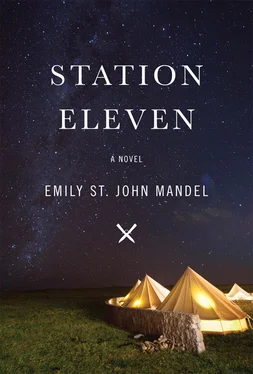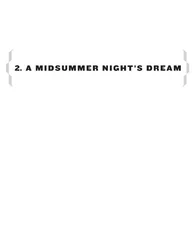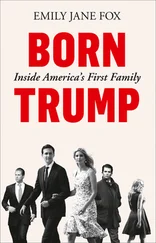RAYMONDE: I was onstage with two other girls in the production, and I was behind Arthur, so I didn’t see his face. But I remember there was some commotion up front, just in front of the stage. And then I remember hearing a sound, this sharp “thwack,” and that was Arthur hitting his hand on the plywood pillar by my head. He’d sort of stumbled back, his arm flailed out, and then a man from the audience had climbed up on the stage and was running toward him—
Clark stopped breathing for a moment when he read it. The shock of encountering someone who knew Arthur, who had not only known him but had seen him die.
The newspapers were passed hand to hand around the airport for four days. They were the first new newspapers anyone had seen since the collapse. When the papers were returned to the museum, Clark held them in his hands for a long while, reading the interview with the actress again. The mention of Arthur aside, he realized, this was an extraordinary development. If there were newspapers now, what else might be possible? In the old days he’d taken quite a few red-eye flights between New York and Los Angeles, and there was a moment in the flight when the rising sunlight spread from east to west over the landscape, dawn reflected in rivers and lakes thirty thousand feet below his window, and although of course he knew it was all a matter of time zones, that it was always night and always morning somewhere on earth, in those moments he’d harbored a secret pleasure in the thought that the world was waking up.
He hoped for more newspapers in the years that followed, but none came.
THE INTERVIEW INYear Fifteen, continued:
RAYMONDE: Do you have any more questions?
DIALLO: I do have more questions, but you didn’t want to answer them.
RAYMONDE: I’ll answer if you don’t record me.
François Diallo set his pen and notebook on the table.
“Thank you,” Kirsten said. “I’ll answer your questions now if you’d like, but only if these ones don’t go in your newspaper.”
“Agreed. When you think of how the world’s changed in your lifetime, what do you think about?”
“I think of killing.” Her gaze was steady.
“Really? Why?”
“Have you ever had to do it?”
François sighed. He didn’t like to think about it. “I was surprised in the woods once.”
“I’ve been surprised too.”
It was evening, and François had lit a candle in the library. It stood in the middle of a plastic tub, for safety. The candlelight softened the scar on Kirsten’s left cheekbone. She was wearing a summer dress with a faded pattern of white flowers on red, three sheathed knives in her belt.
“How many?” he asked.
She turned her wrist to show the knife tattoos. Two.
The Symphony had been resting in New Petoskey for a week and a half so far, and François had interviewed almost all of them. August had told him about walking away from his empty house in Massachusetts with his violin, falling in with a cult for three years before he walked away again and stumbled across the Symphony. Viola had a harrowing story about riding a bicycle west out of the burnt-out ruins of a Connecticut suburb, aged fifteen, harboring vague notions of California but set upon by passersby long before she got there, grievously harmed, joining up with other half-feral teenagers in a marauding gang and then slipping away from them, walking alone for a hundred miles, whispering French to herself because all the horror in her life had transpired in English and she thought switching languages might save her, wandering into a town through which the Symphony passed five years later. The third cello had buried his parents after both died in the absence of insulin, and then spent four years holed up in the safety and boredom of their remote cottage on Michigan’s Upper Peninsula, set out finally because he feared he’d lose his mind if he didn’t find another human being to talk to, also because you can eat only so much venison before you’d give your right arm to eat almost anything else, made his way south and east and over the Mackinac Bridge ten years before the bridge’s center section collapsed, lived on the outskirts of the close-knit band of fishermen in Mackinaw City until the Symphony passed through. When it came down to it, François had realized, all of the Symphony’s stories were the same, in two variations. Everyone else died, I walked, I found the Symphony. Or, I was very young when it happened, I was born after it happened, I have no memories or few memories of any other way of living, and I have been walking all my life.
“Now tell me yours,” she said. “What do you think about?”
“When I think of how the world’s changed, you mean?”
“Yes.”
“My apartment in Paris.” François had been on vacation in Michigan when air travel had ceased. When he closed his eyes, he could still see the intricate moldings of his parlor ceiling, the high white doors leading out to the balcony, the wood floors and books. “Why do you think of killing?”
“You never had to hurt anyone in the old world, did you?”
“Of course not. I was a copywriter.”
“A what?”
“Advertising.” He hadn’t thought about it in a long time. “You know, billboards and such. Copywriters wrote the words on them.”
She nodded, and her gaze drifted away from him. The library was François’s favorite place in his present life. He had accumulated a sizable collection over the years. Books, magazines, a glass case of pre-collapse newspapers. It had only recently occurred to him to start a newspaper of his own, and thus far the project had been invigorating. Kirsten was looking at the improvised printing press, massive in the shadows at the back of the room.
“How did you get that scar on your face?” he asked.
She shrugged. “I’ve actually no idea. It happened during that year I don’t remember.”
“Your brother never told you, before he died?”
“He said it was better if I didn’t remember. I took his word for it.”
“What was he like, your brother?”
“He was sad,” she said. “He remembered everything.”
“You’ve never told me what happened to him.”
“The kind of stupid death that never would’ve happened in the old world. He stepped on a nail and died of infection.” She glanced up at the window, at the failing light. “I should go,” she said, “it’s almost sunset.” She stood, and the handles of the knives in her belt glinted in the half-light. This wire of a woman, polite but lethal, who walked armed with knives through all the days of her life. He’d heard stories from other Symphony members about her knife-throwing abilities. She was supposedly able to hit the center of targets blindfolded.
“I thought tonight was just the musicians.” Reluctant as always to see her go.
“It is, but I told my friends I’d come.”
“Thank you for the interview.” He was walking her to the door.
“You’re welcome.”
“If you don’t mind me asking, why didn’t you want that last part recorded? It isn’t the first time I’ve heard confessions of this nature.”
“I know,” she said. “Almost everyone in the Symphony … but look, I collect celebrity-gossip clippings.”
“Celebrity gossip …?”
“Just about that one actor, Arthur Leander. Because of my collection, the clippings, I understand something about permanent records.”
“And it isn’t something you want to be remembered for.”
“Exactly,” she said. “Are you coming to the performance?”
“Of course. I’ll walk with you.” He went back to blow out the candle. The street had fallen into shadow now, but the sky was still bright over the bay. The Symphony was performing on a bridge a few blocks from the library, the caravans parked off to the side. François heard the first notes, the cacophony of musicians practicing their sections and tuning up. August was playing the same two measures over and over, frowning. Charlie was studying the score. Earlier, a few of the townspeople had carried benches down the hill from the town hall, arranged now in rows facing the bay. Most of the benches were occupied, the adults talking among themselves or watching the musicians, the children spellbound by the instruments.
Читать дальше












